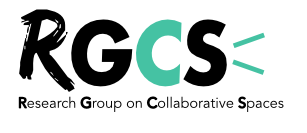Since the beginning of RGCS, this is strong obsession: how to re-invent academia? How to co-produce new academic events? More in touch with society? Contributive to sustainable common worlds? Most academic events follow a dichotomic logic (see figure 1 below).

Figure 1: Two main logics behind research events today?
On the one hand, some research entities and events embody continuities and activities. Laboratories, research groups, internal seminars, are space-time where and when research goes on. The content of research is produced from there, continuously, actively, all year long. Stable and co-present communities, grounded into a specific territory (most of the time a city) are here and now. Of course, logics of distributed projects (global projects) extend in space and time the production and assemblage of knowledge, but the process remain highly continuous. Interestingly, some researchers stress that true encounters, serendipity, openness of labs and their events would be a powerful way to make them more connected to society and common worlds around. But these discontinuities do not really occur.
On the other hand, conferences and workshops embody annual discontinuities. Researchers of a specific field meet every year, far from their instruments, audience, and society at large. They meet in convention centers, travel from all over the world, to spread their word and gospel. The topic of the event changes every year. In particular in social sciences and humanities (e.g. management, economics or sociology), there are rarely points of continuities and memories between each annual conference. Each event in a way is expected to re-create the world and to re-start something new every year. What a missed opportunity! Gathering numerous researchers from one field (sometimes more than 10 000 for some fields) just to come and to leave. Not to use this amazing co-presence to co-produce something (a manifesto, a common knowledge, a true collaboration…). Most of the time, conferences are just space-times for collaborations or ephemeral co-productions. A recent trend has made the problem even more disturbing: the outsourcing of numerous events in the hands of companies managing what is done. Of course, the main issue remains a logistical one (building, rooms, places, buffets, coffee breaks…), but logistics is far from being neutral for the narrative. At the end, continuities of knowledge do not occur at the level of the global community gathered by conferences. Some would object that journals (in particular open journals) and books (e.g. edited books) are the point of continuities missing in my description. I have not the space here to detail a counter-argument, by I am skeptical about this view. Journals (even open access and open science-oriented ones) are more and more stuck in a global market of citations, pushed by winds fostering fragmentation and a lack of societal impact. And sadly, books are less and less present in many fields.
So, what could we do? I have no answer about that. I can just mention one key lesson of an ongoing exploration by RGCS: we need new events in the middle of the two polarities I have just mentioned. Narratives producing new entities hybridizing the logic of labs with that of conferences, continuities and discontinuities, passivities and activities, local and global communities, in search for social usefulness.
Long before RGCS experimentations, peripateticians, American pragmatists and more recently, promoters of citizen sciences, have for sure experimented in these directions. But our digital world, experiencing a major crisis of our modes of shared existence, on the way to radical climate changes, requires also new modes of experimentations. What our open network of researchers and activists has started to do with OWEE is just a first step, among many others. We try. We fail. We try again. We organize regularly, continuously collective drifts in the public spaces of our city. These walks are true inquiries in the pragmatist sense of the term. We start from nothing, do not really know where we go, what are our shared concerns in the flow of our walk (OWEE), we make emerge shared concerns and at the same time, the community walking. We put in contexts and in the loops of our conversations tweets, posts, videos, mentions to existing articles and books. We move together from indetermination to determination (of concerns, problems and gradually, instruments and new ways of working). We also try to connect our OWEEs between each other’s. Beyond that, our open network itself has become a hybrid… neither a research laboratory, nor an organizer of conferences and points of conferences. But something in the middle, both continuous and discontinuous, passive and active, traditional and alternative.
Let’s all talk about this during our next Open Seminar 😊
François-Xavier de Vaujany (PSL, Université Paris-Dauphine)
